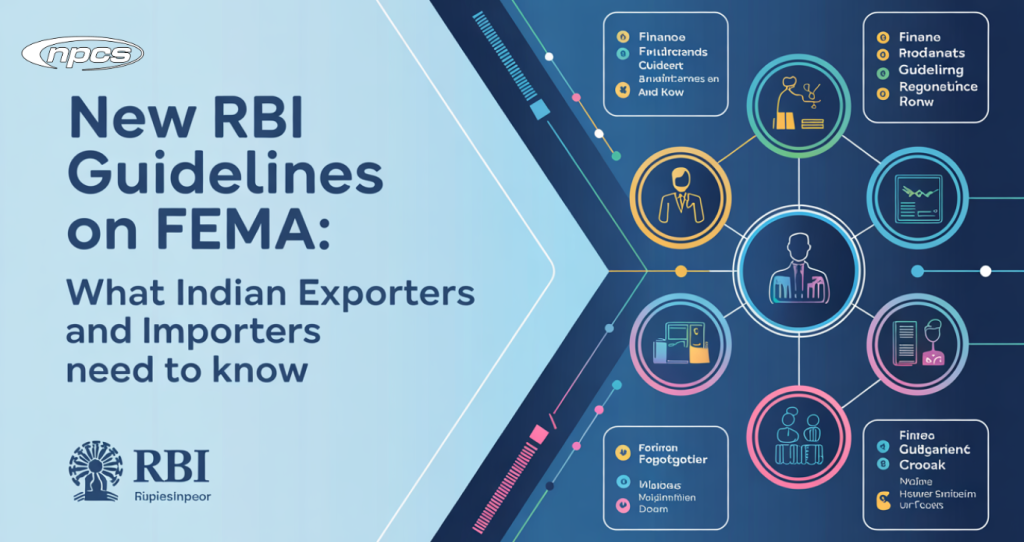In proposing far-reaching amendments to the FEMA regulations, the New RBI Guidelines on FEMA wants to regulate importers and exporters in India to conduct their cross-border trade in goods and services in a way never considered before. The draft regulations were released for public consultation on July 2, 2024, until September 1, 2024, with an intention to simplify and rationalize the current outdated legal framework, ease doing business in the country, and give greater autonomy to the Authorized Dealer (AD) banks.
In this blog, we share an Indian view of what these changes presage for exporters and importers-and why they matter today more than ever in the global trade environment.
Why RBI is Changing FEMA Guidelines
Governor RBI August 7, 2024- The overhaul involves a common effort to bring FEMA in tune with the trends in international trade that are ever-changing. The existing documents in FEMA are considered to be cumbersome and heavy-laden, the word counts of which are over 15,000 for export and somewhat less for imports, i.e., 10,000 and less. The proposals mentioned above include the aim to:
- Create a common export declaration
- Harmonize import/export guidelines for goods and services
- Delegate powers to AD banks
- Thus shortening timelines for realization of certain transactions
The essence is that the realm of regulation is to be converted into one of facilitation by the banks, with due regard to men.
Key Proposals in the New RBI Guidelines on FEMA
✳ Unified Export Declaration
There will be one export declaration form covering all kinds of exports, i.e., goods, services, and software. This simplifies compliance and eliminates the need for separate SOFTEX forms.
✳ Service Exports Get Regulatory Equality
For the first time in history, the government will consider service and software exports equivalent to goods exports. It will treat the date of the invoice as the date of shipment for regulatory purposes.
✳ Delegation to Banks
Most powers formerly exercised by the RBI will now be delegated to the Authorised Dealer banks, provided they have well-defined and board-approved policies at the level. Some of these include:
- Extensions for delays in realisation
- Reductions in values of exports to be realised
- Advance payments for imports or exports
- Project exports and deferred payment terms
✳ Import Settlement Period Deregulated
Council will no longer be able to curb the import settlement period to the six-month limit. Furthermore, the limit will now depend on terms established between the importer and the foreign seller.
Notable Curtailments in Exporter/Importer Facilities
Although the proposed guidelines ease constraints on various fronts, many provisions have also been rolled back significantly:
- Self Write-off Removal- Exporters having ‘Status Holder’ recognition can no longer write off their export receivables by themselves.
- Reduced Realization Window- 15-month timeline for realization of proceeds in the case of goods sent to overseas warehouses has been reduced to nine months.
- Sample Export Waivers Discontinued- Exemption from exporting documentation simply for small-value amounts and sample shipments will be withdrawn.
Key Implications for Banks
AD banks must now:
- Formulate and implement internal policies within six months of the circular for international trade transactions
- Connect the export/import data into systems attached to EDPMS/IDPMS upon the receipt of documents.
- Certify invoices without a whit of involvement into the service delivery itself, creating potential accountability problems.
- Handle merchanting trade transactions with more freedom, but also increased risk
Key Implications for Exporters and Importers
- Increased Bank Discretion: Banks will become the conclusive adjudicators for more such issues like delayed payments, write offs or project exports. This would mean inconsistency across the banks and an increase in scrutiny.
- More Documentation: Even the smallest of exports will now take a declamation in full. Well furnished invoices and shipment dates should be kept to avoid compliance issues.
- Exporters Lose Autonomy: All these like self-write-off and time windows for realisations are no more going to be there. All waivers or discounts need to move through banks.
- Set-Off Simplified: Counterparties will soon have the opportunity to offset export receivables against import payables in a way conducted across calendar years, with the exception of the case in which the goods are mixed with services.
Transition & Compliance Concerns
However, the RBI has left it completely unclear how these new rules would apply during the time period between the issuance of the final circular and the formulation of bank policies. This clearly gives rise to various operational problems, especially with on-going transactions. Not only exporters but also importers will have to anticipate delays and perhaps additional documentation requirements because of banks adjusting to the new framework.
Strategic Takeaways
- Exporters should classify all officials or important persons from their banks with whom they work into banks’ help-shaping campus to tailor a fit for all internal policy frameworks.
- MSMEs would require much handholding, as increased bank discretion could cause them to make compliance and documentation errors.
- Industry associations like EEPC India can combine push factors in this energetic initiative. That should go for transitional safeguards and clarity on ambiguous clauses such as pre-bid bank approvals for project exports.
Conclusion: A Bold Step Forward—With Caveats
The New RBI Guidelines on FEMA marks a progressive shift in India’s foreign exchange regulation framework. Synchronizing it with global standards. The enhanced role of banks can expedite processes and reduce regulatory hollocks. But this would mean a new phase of accountability and due diligence from exporters and importers.
Shareholders should regard the draft regulations not as the final directive but rather as an opportunity to participate in sharing feedback and shaping the regulations that will govern India’s future in international trade.

